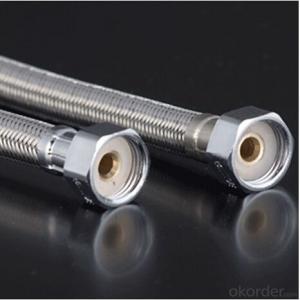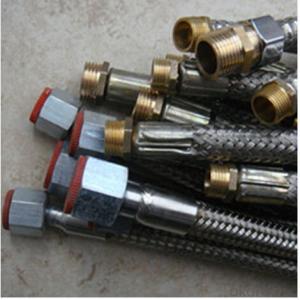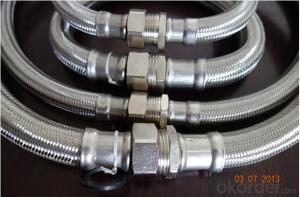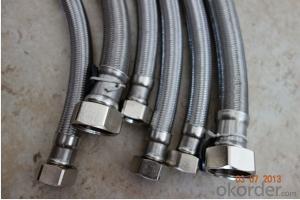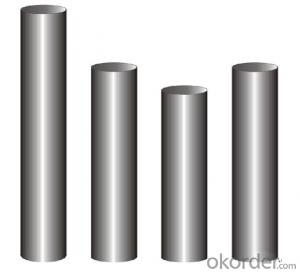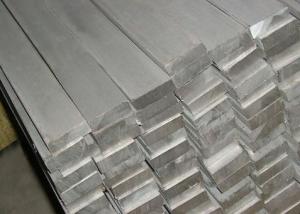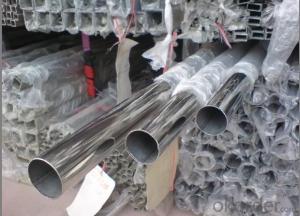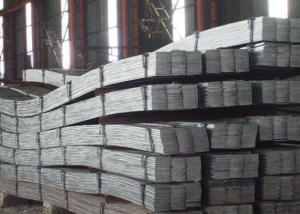Rubber Metal Hose with High Pressure Corrugated
- Loading Port:
- Tianjin
- Payment Terms:
- TT OR LC
- Min Order Qty:
- 1000 pc
- Supply Capability:
- 100000 pc/month
OKorder Service Pledge
OKorder Financial Service
You Might Also Like
Item specifice
Rubber Metal Hose with High Pressure Corrugated
Applications of Rubber Metal Hose with High Pressure Corrugated:
--Refueling system
--Chemical and pharmaceutical industry
--Industrial hydraulic systems
--Air conditioners in industrial and construction –site vehicles
--Food and beverage industry
--Special and standard industrial applications
--Water and cleaning management
Features of Rubber Metal Hose with High Pressure Corrugated:
1. )O. D.: 13-18MM 0.2-3M long
2. )Nut.: Nickel/Chrome Plated Brass (Zinc / Iron / Aluminum is available)
3. )Size Of Nut.: Female&Male 1/2''; 3/4''; 3/8''; 7/8''; 5/16'', and M10...
4. )Insert.: Brass (Zinc / Aluminum / Plastic is available)
5. )Inner tube.: Rubber/ EPDM/PVC
6. )Covered Material: Stainless Steel 201, 301, 304 /Aluminium Wire
7. )Working Pressure: 5Kg-15Kg
8. )Temperature: 0-92° C
9. )Quality Assurance: 3 years
RemarkAPPLICATION: HOUSEEHOLD WARE, BATHROOM WARE, SHOWER HOSE
PAYMENT: T/T, L/C
DELIVERY TIME: 20DAYS OR 30DAYS AFTER RECEIVED 30% DEPOSITS
MOQ: 5000PCS
ODM&OEM IS ACCEPTABLE
PackageInner: PP bag /Blister packing Outer: Carton box
Specifications of Rubber Metal Hose with High Pressure Corrugated:
NO | I.D | Refer to O.D | Working pressure | Burst pressure | approximate Weight | |||||
(inch) | (mm) | (inch) | (mm) | MPa | Psi | MPa | Psi | kg/m | lbs/ft | |
1 | 1/8 | 3.2±0.2 | 0.35 | 9±0.3 | 2.06 | 300 | 8.27 | 1200 | 0.078 | 0.12 |
2 | 5/32 | 4±0.2 | 0.4 | 10±0.3 | 2.06 | 300 | 8.27 | 1200 | 0.092 | 0.14 |
3 | 3/16 | 4.8±0.2 | 0.43 | 11±0.3 | 2.06 | 300 | 8.27 | 1200 | 0.108 | 0.16 |
4 | 1/4 | 6.3±0.3 | 0.5 | 12.7±0.3 | 2.06 | 300 | 8.27 | 1200 | 0.134 | 0.2 |
5 | 5/16 | 8.0±0.3 | 0.56 | 14±0.3 | 2.06 | 300 | 8.27 | 1200 | 0.147 | 0.22 |
6 | 3/8 | 9.5±0.3 | 0.63 | 16±0.4 | 2.06 | 300 | 8.27 | 1200 | 0.182 | 0.27 |
7 | 15/32 | 12±0.3 | 0.75 | 19±0.5 | 2.06 | 300 | 8.27 | 1200 | 0.238 | 0.35 |
8 | 1/2 | 12.7±0.4 | 0.78 | 20±0.5 | 2.06 | 300 | 8.27 | 1200 | 0.262 | 0.39 |
9 | 5/8 | 16±0.4 | 0.94 | 24±0.5 | 1.03 | 150 | 4.12 | 600 | 0.351 | 0.52 |
10 | 3/4 | 19±0.4 | 1.13 | 28.8±0.5 | 1.03 | 150 | 4.12 | 600 | 0.515 | 0.77 |
11 | 1 | 25.4±0.5 | 1.38 | 35±0.6 | 1.03 | 150 | 4.12 | 600 | 0.637 | 0.95 |
Images of Rubber Metal Hose with High Pressure Corrugated:
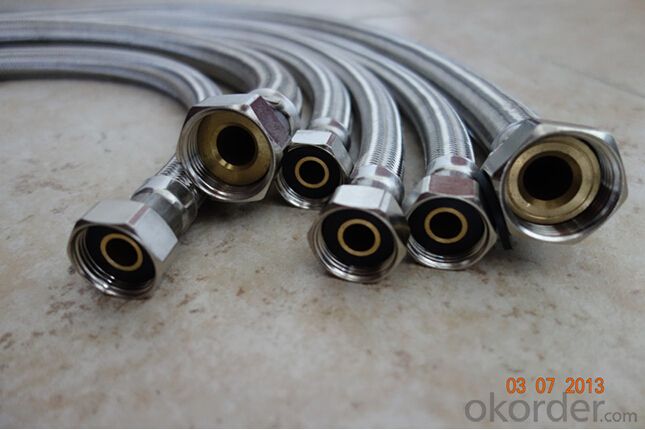
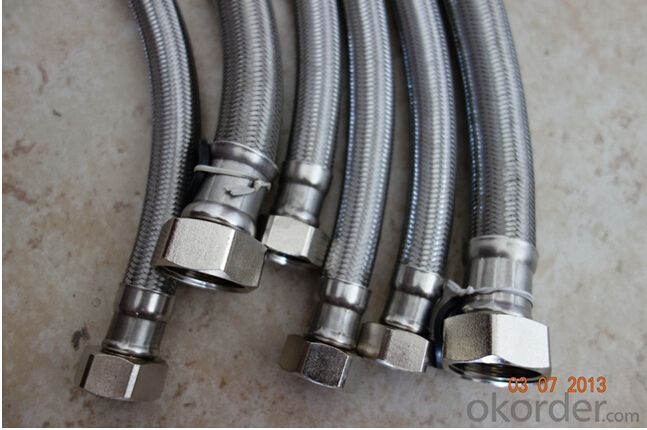
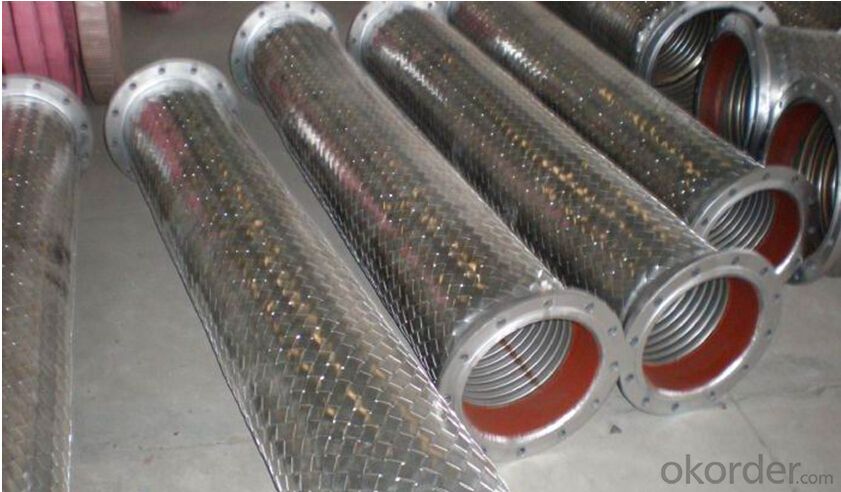
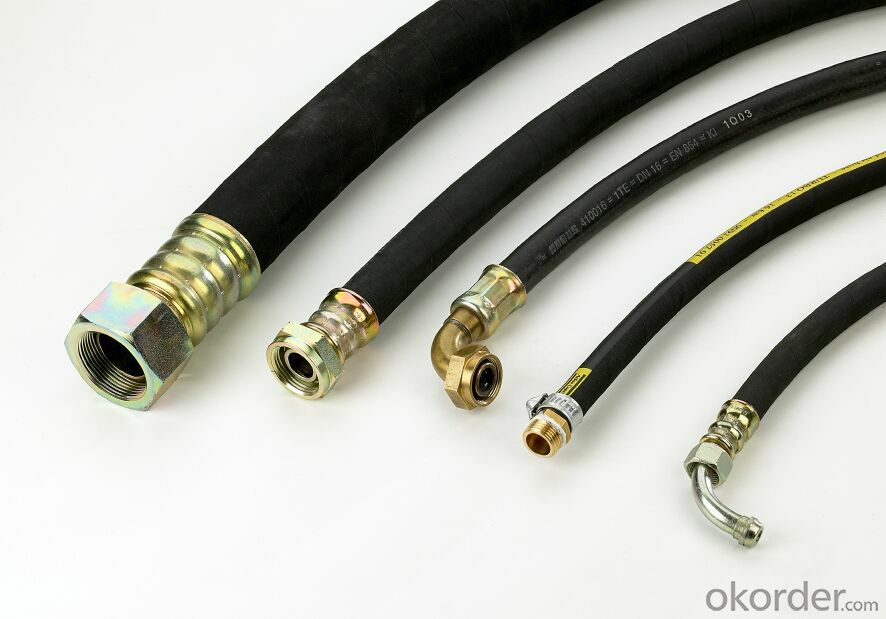
Package of Rubber Metal Hose with High Pressure Corrugated:
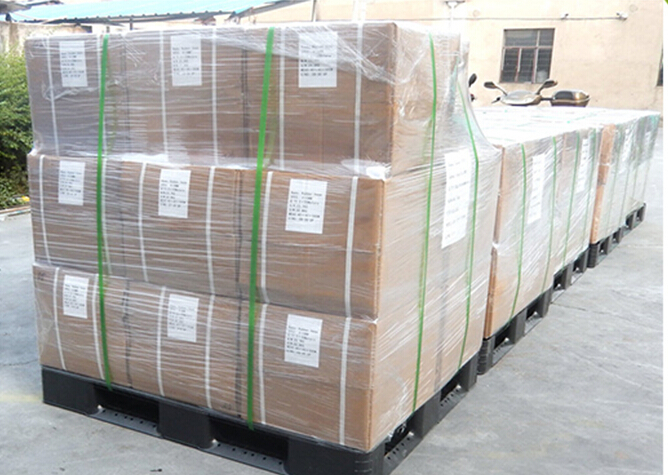
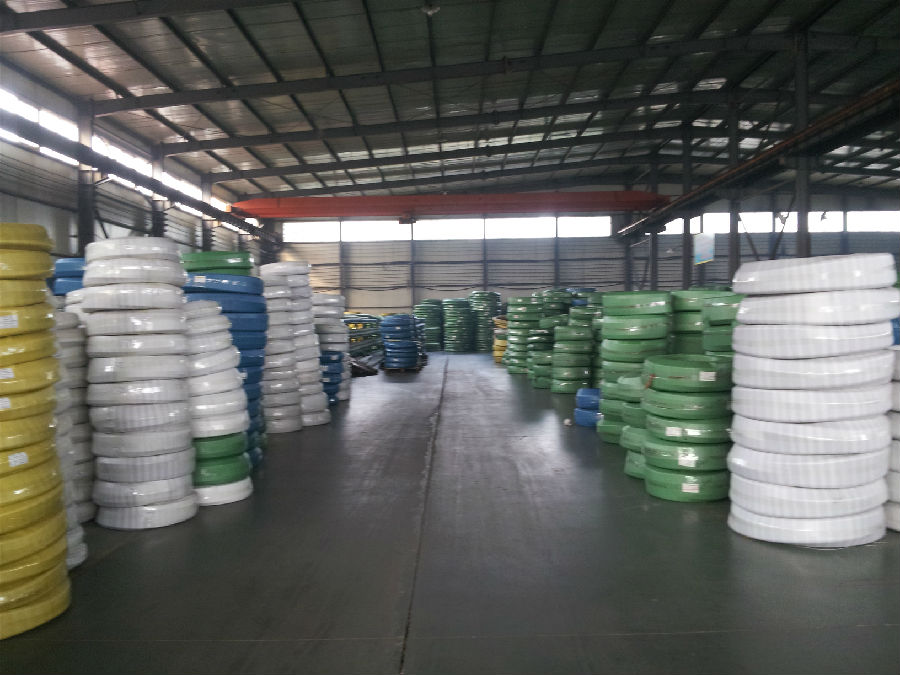
FAQ of Rubber Metal Hose with High Pressure Corrugated:
Who we are:
Answer: We CNBM is a Chinese state-owned enterprise ranked 267th among the Global Fortune 500, as the largest building materials company,we have over 300 affiliated companies,and so many production lines and branch office distribute in China.
2. About our quality:
Answer: Every product needs to be quality proved before shipping.
3. About our service:
Answer: We could gurantte that we can reply you in 2 working hours.
- Q:Can stainless steel pipes be chromed?
- Indeed, it is possible to chrome stainless steel pipes. To achieve this, a layer of chromium is applied onto the surface of the stainless steel pipe through a process called chrome plating. Typically, this involves immersing the stainless steel pipe in a solution containing chromium salts, while an electric current is passed through the bath. As a result, the chromium adheres to the surface of the stainless steel pipe. This chrome plating not only enhances the appearance of the stainless steel pipe but also provides a protective finish, increasing its resistance to corrosion and wear.
- Q:Are stainless steel pipes suitable for cryogenic applications?
- Yes, stainless steel pipes are suitable for cryogenic applications. Stainless steel has excellent mechanical properties, including high strength and good corrosion resistance, which make it ideal for handling extremely low temperatures. Additionally, stainless steel has low thermal conductivity, which helps to minimize heat transfer and maintain the desired cryogenic temperatures.
- Q:Are stainless steel pipes suitable for liquid storage tanks?
- Yes, stainless steel pipes are suitable for liquid storage tanks. Stainless steel offers excellent corrosion resistance, durability, and strength, making it a reliable choice for storing various liquids. Additionally, stainless steel is hygienic, easy to clean, and has a long lifespan, making it a preferred material for liquid storage tanks in industries such as food processing, pharmaceuticals, and chemicals.
- Q:Are stainless steel pipes suitable for underground irrigation systems?
- Yes, stainless steel pipes are suitable for underground irrigation systems. Stainless steel is highly resistant to corrosion, making it an excellent choice for installations that are exposed to moisture, soil, and other elements found underground. It provides durability and longevity, ensuring that the irrigation system remains functional and reliable for an extended period. Additionally, stainless steel pipes have high tensile strength, making them capable of withstanding the pressure and stress that can occur in underground installations. Overall, stainless steel pipes are a reliable and suitable option for underground irrigation systems.
- Q:Can stainless steel pipes be used in chemical processing plants?
- Yes, stainless steel pipes can be used in chemical processing plants. Stainless steel is highly resistant to corrosion, making it suitable for handling various chemicals and corrosive substances commonly found in such plants. Additionally, stainless steel pipes offer high strength, durability, and versatility, making them a preferred choice for conveying fluids and gases in chemical processing industries.
- Q:Can stainless steel pipes be used for power generation?
- Yes, stainless steel pipes can be used for power generation. Stainless steel is a highly versatile and durable material that is commonly used in various industries, including power generation. It offers excellent corrosion resistance, high strength, and heat resistance, making it suitable for applications involving high temperatures and pressures. In power generation, stainless steel pipes are often used in the construction of power plants, including fossil fuel-fired plants, nuclear power plants, and renewable energy facilities. They are used for transporting various fluids, such as steam, water, and fuel, within the power generation system. Stainless steel pipes are particularly beneficial in power generation due to their ability to withstand extreme conditions, including high temperatures and corrosive environments. They provide excellent resistance against corrosion, which helps to maintain the integrity and longevity of the pipes, ensuring the continuous and reliable operation of power generation systems. Furthermore, stainless steel pipes are highly resistant to thermal expansion and contraction, which is crucial in power generation applications that involve frequent temperature changes. This characteristic helps to prevent leaks and maintain the overall efficiency of the power generation process. In conclusion, stainless steel pipes are widely used in power generation due to their excellent corrosion resistance, high strength, and ability to withstand extreme conditions. They play a vital role in transporting fluids within power plants and contribute to the overall efficiency and reliability of power generation systems.
- Q:Are stainless steel pipes suitable for food processing industries?
- Yes, stainless steel pipes are highly suitable for food processing industries. Stainless steel is corrosion-resistant, hygienic, and does not react with food or alter its taste. It is also easy to clean and maintain, making it an ideal choice for transporting food and beverages in a safe and efficient manner.
- Q:The difference between galvanized steel pipe and stainless steel pipe
- Cast iron pipes (Cast, Iron, Pipe), cast cast pipe. Cast iron pipes are used for water supply, drainage and gas transmission lines. They include cast iron pipes and pipe fittings. Labor intensity is small. According to the casting method, it is divided into continuous cast iron pipe and centrifugal cast iron pipe, in which the centrifugal cast iron pipe is divided into sand mould and metal type two kinds. Divided into gray cast iron pipe and nodular cast iron pipe according to different material. According to the interface form, it is divided into flexible interface, flange interface, self anchored interface, rigid interface and so on. Among them, the flexible iron pipes rubber sealing ring; flange interface cast iron pipe flange fixed in the rubber pad, the flange gasket sealing; rigid interface cast iron pipe socket is large, straight pipe is inserted, sealed with cement, this technology has been basically eliminated
- Q:Can stainless steel pipes be used in the oil and gas industry?
- Yes, stainless steel pipes can be used in the oil and gas industry. Stainless steel pipes offer several advantages that make them suitable for use in this industry. Firstly, stainless steel has high corrosion resistance, which is crucial for withstanding the harsh environments and corrosive substances present in the oil and gas industry. This resistance to corrosion helps to prevent leaks and ensures the integrity of the pipes, promoting safety and reliability. Additionally, stainless steel pipes have excellent strength and durability, allowing them to withstand high pressures and temperatures that are often encountered in oil and gas operations. Moreover, stainless steel is non-reactive, meaning it does not contaminate the oil or gas being transported, ensuring the purity and quality of the product. Overall, the superior properties of stainless steel make it a preferred choice for oil and gas industry applications, providing a reliable and long-lasting solution.
- Q:How do stainless steel pipes compare to polyethylene pipes?
- Stainless steel pipes and polyethylene pipes are two commonly used materials for various plumbing and industrial applications. While both materials have their advantages and disadvantages, they differ in terms of strength, durability, cost, and application suitability. Stainless steel pipes are known for their exceptional strength and durability. They can withstand high pressure and temperature, making them suitable for applications in industries such as oil and gas, chemical processing, and water distribution. Stainless steel pipes are also resistant to corrosion, rust, and fire, making them a reliable choice for long-term use. However, they tend to be heavier and more expensive than polyethylene pipes. On the other hand, polyethylene pipes are lightweight, flexible, and relatively inexpensive compared to stainless steel pipes. They are commonly used in applications such as irrigation, water supply, and drainage systems. Polyethylene pipes are resistant to chemicals, impact, and abrasion, making them suitable for underground installation. However, they may not be as durable as stainless steel pipes and may require more frequent replacements or repairs in some cases. In terms of installation and maintenance, stainless steel pipes are generally more demanding as they require specialized tools and skills. Polyethylene pipes, on the other hand, are easier to install and maintain due to their flexibility and simple jointing techniques. Ultimately, the choice between stainless steel pipes and polyethylene pipes depends on the specific requirements of the application. If strength, durability, and resistance to extreme conditions are crucial, stainless steel pipes are the preferred option. For less demanding applications that require cost-effectiveness, flexibility, and ease of installation, polyethylene pipes may be more suitable. It is important to consider factors such as budget, operating conditions, lifespan, and maintenance requirements when comparing these two pipe materials.
1. Manufacturer Overview |
|
|---|---|
| Location | |
| Year Established | |
| Annual Output Value | |
| Main Markets | |
| Company Certifications | |
2. Manufacturer Certificates |
|
|---|---|
| a) Certification Name | |
| Range | |
| Reference | |
| Validity Period | |
3. Manufacturer Capability |
|
|---|---|
| a)Trade Capacity | |
| Nearest Port | |
| Export Percentage | |
| No.of Employees in Trade Department | |
| Language Spoken: | |
| b)Factory Information | |
| Factory Size: | |
| No. of Production Lines | |
| Contract Manufacturing | |
| Product Price Range | |
Send your message to us
Rubber Metal Hose with High Pressure Corrugated
- Loading Port:
- Tianjin
- Payment Terms:
- TT OR LC
- Min Order Qty:
- 1000 pc
- Supply Capability:
- 100000 pc/month
OKorder Service Pledge
OKorder Financial Service
Similar products
New products
Hot products
Related keywords
